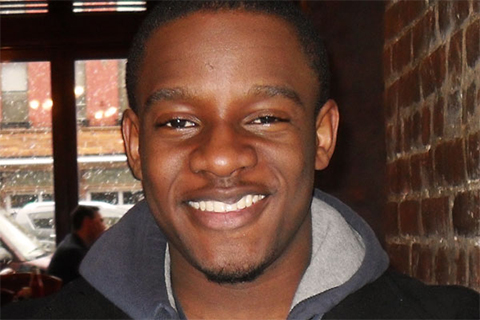
Ayodele Odutayo, a fourth-year medical student at the Faculty of Medicine, has served as co-director of U of T’s International Health Program and currently represents Canadian medical students on the Canadian Medical Association Committee on Healthcare and Promotion. He spoke recently with Nicole Bodnar at U of T News.
What’s it like to win a Rhodes scholarship?
The entire experience has been surreal and has taken time to sink in. I am extremely humbled to have been chosen along with Connor and Joanne. The process has been very meaningful, because it challenges you to reflect on your experiences and develop a clear sense of what motivates you and what contribution you hope to make.
What drew you to the University of Toronto?
As an undergraduate student, I was attracted to U of T’s Doctor of Medicine program because of the broad clinical exposure that could be obtained in this multicultural and diverse city. The ability to work in varied hospital settings was also appealing and I enjoyed my clinical placements at Sunnybrook, St. Michael’s and Toronto Western Hospitals.
Why is nephrology an area of interest for you?
Although nephrology is sub-specialized, it provides exposure to all aspects of medicine. From managing the precursors of kidney disease to treating patients with chronic kidney disease and end-stage renal disease, nephrology involves the entire spectrum of health care.
Tell us about some of your U of T activities and projects.
Leading U of T’s International Health Program alongside Andy Tran (a former U of T student) from 2010 to 2011 to increase student activism in global health was very rewarding. With a 100-student team, we introduced new initiatives, including the Global Health Education website that allows students to discuss health-care disparities. We also revitalized the Refugee Health program, where students can conduct health-care seminars for Canadian refugees.
Why is volunteer work important?
The world is becoming much more interconnected, and learning about challenges in other areas broadens our perspective and informs our decision-making. There is also a basic social responsibility to work for the betterment of our society. Involvement in global health initiatives is one avenue for fulfilling that duty.
Tell us about the friends and mentors who have influenced you.
Among my mentors, Michelle Hladunewich stands out. It is because of her support that I have been able to pursue diverse learning opportunities, such as working with the World Health Organization. I am also fortunate to have been mentored by David Cherney, Ron Wald (a professor in U of T’s division of nephrology and a physician at St. Michael’s Hospital) and Diana Alli (retired head of the Faculty of Medicine’s Office of Health Professions Student Affairs).
I am humbled to be a member of the 1T3 class and to have worked with students on global health initiatives. I have learned so much from our joint efforts. Last but not least, my mother has made numerous sacrifices in support of my education, and I would not have any of these opportunities without her.

